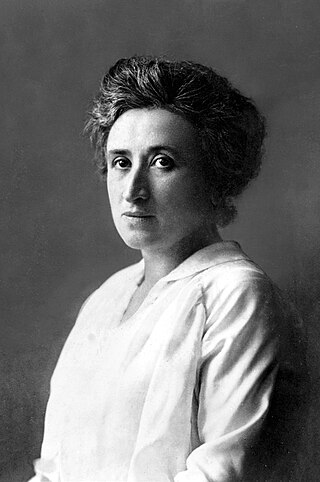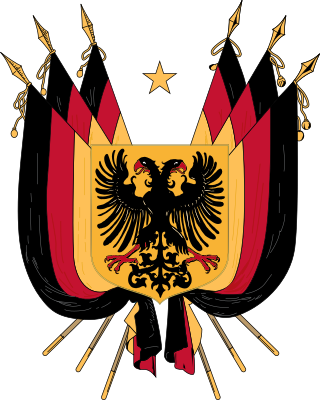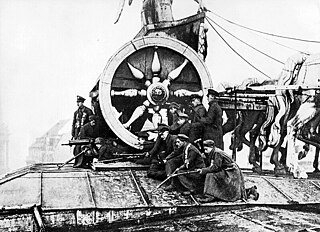German National Assembly (German: Nationalversammlung) may refer to:
- Frankfurt Parliament during the German revolutions of 1848–49
- Weimar National Assembly after the German Revolution of 1918–19 at the end of World War I
German National Assembly (German: Nationalversammlung) may refer to:
Diet may refer to:
In politics, a national assembly is either a unicameral legislature, the lower house of a bicameral legislature, or both houses of a bicameral legislature together. In the English language it generally means "an assembly composed of the representatives of the nation." The population base represented by this name is manifestly the nation as a whole, as opposed to a geographically select population, such as that represented by a provincial assembly. The powers of a National Assembly vary according to the type of government. It may possess all the powers of government, generally governing by committee, or it may function solely within the legislative branch of the government.

The German Confederation was an association of 39 predominantly German-speaking sovereign states in Central Europe. It was created by the Congress of Vienna in 1815 as a replacement of the former Holy Roman Empire, which had been dissolved in 1806 as a result of the Napoleonic Wars.

Rosa Luxemburg was a Polish and naturalised-German revolutionary socialist, orthodox Marxist, and anti-War activist during the First World War. She became a key figure of the revolutionary socialist movements of Poland and Germany during the late 19th and early 20th century, particularly the Spartacist uprising.

Marie Joseph Louis Adolphe Thiers was a French statesman and historian. He was the second elected President of France and first President of the Third Republic.

The National Constituent Assembly was a constituent assembly in the Kingdom of France formed from the National Assembly on 9 July 1789 during the first stages of the French Revolution. It dissolved on 30 September 1791 and was succeeded by the Legislative Assembly.

Frederick William IV, the eldest son and successor of Frederick William III of Prussia, was king of Prussia from 7 June 1840 until his death on 2 January 1861. Also referred to as the "romanticist on the throne", he was deeply religious and believed that he ruled by divine right. He feared revolutions, and his ideal state was one governed by the Christian estates of the realm rather than a constitutional monarchy.

The Revolutions of 1848 in the Austrian Empire were a set of revolutions that took place in the Austrian Empire from March 1848 to November 1849. Much of the revolutionary activity had a nationalist character: the Empire, ruled from Vienna, included ethnic Germans, Hungarians, Poles, Bohemians (Czechs), Ruthenians (Ukrainians), Slovenes, Slovaks, Romanians, Croats, Italians, and Serbs; all of whom attempted in the course of the revolution to either achieve autonomy, independence, or even hegemony over other nationalities. The nationalist picture was further complicated by the simultaneous events in the German states, which moved toward greater German national unity.

The German revolutions of 1848–1849, the opening phase of which was also called the March Revolution, were initially part of the Revolutions of 1848 that broke out in many European countries. They were a series of loosely coordinated protests and rebellions in the states of the German Confederation, including the Austrian Empire. The revolutions, which stressed pan-Germanism, liberalism and parliamentarianism, demonstrated popular discontent with the traditional, largely autocratic political structure of the thirty-nine independent states of the Confederation that inherited the German territory of the former Holy Roman Empire after its dismantlement as a result of the Napoleonic Wars. This process began in the mid-1840s.

Beginning in May 1968, a period of civil unrest occurred throughout France, lasting seven weeks and punctuated by demonstrations, general strikes, and the occupation of universities and factories. At the height of events, which have since become known as May 68, the economy of France came to a halt. The protests reached a point that made political leaders fear civil war or revolution; the national government briefly ceased to function after President Charles de Gaulle secretly fled France to West Germany on the 29th. The protests are sometimes linked to similar movements around the same time worldwide that inspired a generation of protest art in the form of songs, imaginative graffiti, posters, and slogans.

The Frankfurt National Assembly was the first freely elected parliament for all German states, including the German-populated areas of the Austrian Empire, elected on 1 May 1848.

The Hungarian Revolution of 1956, also known as the Hungarian Uprising, was an attempted countrywide revolution against the government of the Hungarian People's Republic (1949–1989) and the policies caused by the government's subordination to the Soviet Union (USSR). The uprising lasted 12 days before being crushed by Soviet tanks and troops on 4 November 1956. Thousands were killed and wounded and nearly a quarter of a million Hungarians fled the country.

The German revolution of 1918–1919, also known as the November Revolution, was an uprising started by workers and soldiers in the final days of World War I. It quickly and almost bloodlessly brought down the German Empire, then, in its more violent second stage, the supporters of a parliamentary republic were victorious over those who wanted a Soviet-style council republic. The defeat of the forces of the far left cleared the way for the establishment of the Weimar Republic. The key factors leading to the revolution were the extreme burdens suffered by the German people during the war, the economic and psychological impacts of the Empire's defeat, and the social tensions between the general populace and the aristocratic and bourgeois elite.

The insurrection of 10 August 1792 was a defining event of the French Revolution, when armed revolutionaries in Paris, increasingly in conflict with the French monarchy, stormed the Tuileries Palace. The conflict led France to abolish the monarchy and establish a republic.

During the French Revolution, the National Assembly, which existed from 17 June 1789 to 9 July 1789, was a revolutionary assembly of the Kingdom of France formed by the representatives of the Third Estate (commoners) of the Estates-General and eventually joined by some members of the First and Second Estates. Thereafter, it became a legislative body known as the National Constituent Assembly, although the shorter form was favored.

The May Uprising took place in Dresden, Kingdom of Saxony in 1849; it was one of the last of the series of events known as the Revolutions of 1848.
Frankfurt am Main is a major city in Hesse, Germany.

The Landtag of Prussia was the representative assembly of the Kingdom of Prussia implemented in 1849, a bicameral legislature consisting of the upper House of Lords (Herrenhaus) and the lower House of Representatives (Abgeordnetenhaus). After World War I and the German Revolution of 1918–19 the Landtag diet continued as the parliament of the Free State of Prussia between 1921 and 1934, when it was abolished by the Nazi regime.

The trial of Louis XVI—officially called "Citizen Louis Capet" since being dethroned—before the National Convention in December 1792 was a key event of the French Revolution. He was convicted of high treason and other crimes, resulting in his execution.

The Spartacist uprising, also known as the January uprising or, more rarely, Bloody Week, was an armed uprising that took place in Berlin from 5 to 12 January 1919. It occurred in connection with the German revolution that broke out just before the end of World War I. The uprising was primarily a power struggle between the supporters of the provisional government led by Friedrich Ebert of the Majority Social Democratic Party of Germany (MSPD), which favored a social democracy, and those who backed the position of the Communist Party of Germany (KPD) led by Karl Liebknecht and Rosa Luxemburg, which wanted to set up a council republic similar to the one established by the Bolsheviks in Russia. The government's forces were victorious in the fighting.